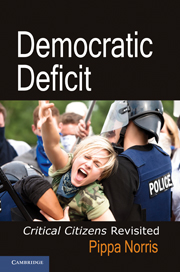Book contents
- Frontmatter
- Contents
- List of Tables
- List of Figures
- Preface and Acknowledgments
- PART I INTRODUCTION
- PART II SYMPTOMS
- PART III DIAGNOSIS
- PART IV PROGNOSIS
- 12 Conclusions and Implications
- Technical Appendix A Concepts and Measures
- Technical Appendix B Countries in the Pooled World Values Survey, 1981–2007
- Technical Appendix C Methods
- Notes
- Selected Bibliography
- Index
Technical Appendix C - Methods
Published online by Cambridge University Press: 05 June 2012
- Frontmatter
- Contents
- List of Tables
- List of Figures
- Preface and Acknowledgments
- PART I INTRODUCTION
- PART II SYMPTOMS
- PART III DIAGNOSIS
- PART IV PROGNOSIS
- 12 Conclusions and Implications
- Technical Appendix A Concepts and Measures
- Technical Appendix B Countries in the Pooled World Values Survey, 1981–2007
- Technical Appendix C Methods
- Notes
- Selected Bibliography
- Index
Summary
As not all readers may be familiar with the multilevel analytical methods used in this study, a brief note helps to clarify the techniques. The general theory developed in Chapter 1 predicts that on the demand side, individual characteristics (such as education, age, and access to the news media) will have a direct effect on individual-level democratic orientations. In addition, the account predicts that on the supply side, certain contextual or societal-level factors in each nation-state will also have an important direct effect on these orientations, including the role of human development, the historical experience of democratization in each society, the process and policy performance of democratic regimes, the power-sharing structure of regimes, and levels of media freedom.
To operationalize these factors, the key models in the book involve measurement at two distinct levels. A representative sample of individual respondents (level 1) is nested within national-level contexts (level 2). The World Values Survey was conducted among a representative random sample of the adult population within each nation-state.
Many previous studies about political trust have employed ordinary least squares (OLS) regression for analysis. The danger of using this method is that the standard errors of the regression coefficients can be inaccurate for contextual variables, by overestimating the degrees of freedom (number of cases), and therefore tests of significance can prove misleading. OLS models can seek to control for national variations by using a pooled model, including dummy variables for each country, but this becomes inefficient with the coverage of many nations.
Information
- Type
- Chapter
- Information
- Democratic DeficitCritical Citizens Revisited, pp. 254 - 258Publisher: Cambridge University PressPrint publication year: 2011
